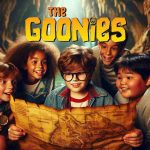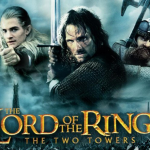JURASSIC PARK (1993)

Released in 1993, Jurassic Park is an iconic film directed by Steven Spielberg that has left a profound impact on popular culture and the science-fiction genre. Based on the bestselling novel by Michael Crichton, the film masterfully blends adventure, suspense, and groundbreaking special effects to bring dinosaurs to life in a way never before seen on the big screen.
The Story That Sparked Our Imagination
The plot of Jurassic Park revolves around a visionary billionaire, John Hammond (played by Richard Attenborough), who creates a theme park on a remote island, Isla Nublar, where real-life dinosaurs have been brought back from extinction through advanced genetic engineering. Hammond invites a group of experts, including paleontologist Dr. Alan Grant (Sam Neill), paleobotanist Dr. Ellie Sattler (Laura Dern), and mathematician Dr. Ian Malcolm (Jeff Goldblum), to inspect the park before it opens to the public. However, what begins as an awe-inspiring experience soon turns into a nightmare when the park’s security systems fail, allowing the dinosaurs to roam freely and endangering everyone on the island.
Groundbreaking Visual Effects
What truly sets Jurassic Park apart is its revolutionary use of CGI (computer-generated imagery) and animatronics. Spielberg worked closely with Industrial Light & Magic (ILM) and Stan Winston Studios to create stunningly realistic dinosaurs, combining cutting-edge technology with practical effects. The result was a seamless integration of CGI and animatronics that made dinosaurs like the terrifying Tyrannosaurus rex and the cunning Velociraptors feel like living, breathing creatures. This achievement not only set new standards for visual effects in filmmaking but also changed the way movies were made in the digital age.

The Cast: Bringing the Adventure to Life
The success of Jurassic Park is also credited to its talented cast. Sam Neill’s portrayal of the no-nonsense Dr. Alan Grant, alongside Laura Dern’s compassionate Dr. Ellie Sattler, grounded the film with heart and intellect. Jeff Goldblum’s performance as the quirky and charming Dr. Ian Malcolm added a layer of humor and philosophical insight, particularly with his famous line, “Life finds a way.” Richard Attenborough’s portrayal of the idealistic yet flawed John Hammond gave the film its emotional core, as he grapples with the consequences of playing god.
Thrills, Suspense, and a Dash of Science
While Jurassic Park is undoubtedly a thrilling adventure film, it also touches on deeper themes such as the ethics of genetic engineering, the unpredictability of nature, and the hubris of mankind in trying to control forces beyond its understanding. The movie balances these thought-provoking ideas with pulse-pounding suspense, as the characters face off against the dinosaurs in several iconic scenes, including the unforgettable T. rex attack and the Velociraptor kitchen sequence.
Legacy and Impact
Jurassic Park was a massive box office success, grossing over $1 billion worldwide and becoming the highest-grossing film of all time until Titanic took the title in 1997. Its influence extends far beyond its financial success, inspiring generations of filmmakers, visual effects artists, and scientists alike. The film spawned a franchise that includes several sequels, merchandise, video games, and even theme park attractions, making Jurassic Park a cultural phenomenon that continues to captivate audiences today.
Conclusion
More than three decades after its release, Jurassic Park remains a timeless classic that seamlessly blends adventure, science fiction, and cutting-edge technology. It not only redefined what was possible in filmmaking but also sparked a renewed fascination with dinosaurs and the possibilities of genetic science. Spielberg’s Jurassic Park is not just a movie—it’s an experience that has left an indelible mark on the world of cinema and continues to inspire awe in both new and longtime fans.
Suggested videos for you:











